Maccabee Town Chanukah celebration promises to be bigger, better
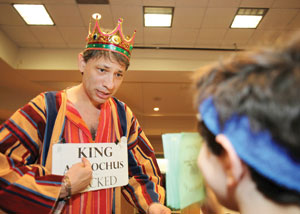 More than 200 people filled the lobby and social hall of the Jewish Community Campus last year for the community’s Chanukah celebration. This year organizers hope at least 300 people will attend Return to Maccabee Town: A Community Chanukah Celebration! Sunday, Dec. 11.
More than 200 people filled the lobby and social hall of the Jewish Community Campus last year for the community’s Chanukah celebration. This year organizers hope at least 300 people will attend Return to Maccabee Town: A Community Chanukah Celebration! Sunday, Dec. 11.
Bridey Stangler, the Jewish Community Center’s director of camps and family program coordinator, said this year’s Maccabee Town is absolutely a community endeavor with 12 different partners. Coordinated by the JCC, partners include congregations BIAV, Beth Shalom, Beth Torah, B’nai Jehudah, Kol Ami and Temple Israel; Torah Learning Center; Hyman Brand Hebrew Academy; Jewish Family Services; Jewish Federation/PJ Library and KC Kollel. Funds are being provided by the Jewish Heritage Foundation, the Jewish Federation and the Jewish Community Foundation.
“The most exciting piece of this event is the collaboration of the different Jewish faith-based organizations,” said Mickey Bowen, the event co-chair. “We hope all these organizations bring lots of people to Maccabee Town.”
Stangler said the event is geared for people of all ages. In only its second year in this format, it has grown tremendously. Last year’s event, spearheaded by the JCC, was also sponsored by HBHA and The PJ Library.
“We planned the activities, we took care of the food, but this year we have a whole bunch of people contributing a whole bunch of things,” Stangler said.
While the JCC is still the organizing agency, Stangler is proud that “it’s the community that’s coming together to provide the real Chanukah fun.”
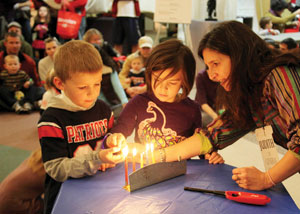 The event is scheduled before Chanukah begins as a way to extend the fun.
The event is scheduled before Chanukah begins as a way to extend the fun.
“During Chanukah, families seem to have a different option every night, whether it’s a party, a temple celebration or dinner with the family. This year we didn’t want families to have to choose. With Maccabee Town on the sixth night last year, it almost felt like people were Chanukah-ed out, and had had their fill of latkes and dreidels. We’re trying to beat the rush,” Stangler said.
Several favorite activities from last year, such as the life-sized maze, will return.
“We weren’t planning to bring it back, but so many people asked if we were bringing it back that we thought we should,” Stangler said. “It’s going to be big and as exciting as it was last year.”
As in previous Chanukah celebrations, potato latkes will be sold. However this year HBHA’s ninth-grade class is in charge of the latke sale and it will serve as a fundraiser for the students’ trip.
Stangler pointed out there are other new activities this year as well.
“Last year the social hall was filled with carnival type Chanukah activities. Our goal this year is to recreate the time period of the Chanukah story, 167 BCE as much as we can,” she said.
She said the organizations and congregations have really risen to the challenge.
“They are not just coming up with latke bingo or Chanukah card making, but getting into the time period. One group is going to do weaving. One group is going to do candle making. Another is going to do a small cooking project, maybe latkes. It’s going to be in the spirit of last year only bigger and better and something different than the community has ever seen,” Stangler said.
A Chanukah shuk (marketplace) is also new this year. Every participating organization has the option of setting up a booth in the dining room.
“Anybody who needs to do some Chanukah shopping will be able to do so right at Maccabee Town,” Stangler said. “You can buy your candles and maybe even a new Chanukiah.”
Around 5:30 p.m., Maccabee Town events will begin winding down. At that time Jill Maidhof will tell the Chanukah story. That will be followed by an educational lighting of the menorah.
“It won’t be a ceremonial lighting, as Chanukah will not yet have begun,” Stangler explained.
Children will want to stay for the very end and see the sword-fighting demonstration, which Stangler said was very popular last year.
The evening will end with a performance by the Tikvah Dancers. The Israeli dance troupe will invite members in the audience to join them at the conclusion of the event.
Once again, Stangler is thrilled with the cooperative aspect of the event.
“It’s really nice to collaborate because the combined creativity and the efforts of everybody just really benefit this community.”
Maccabee Town
Time: 3 to 6 p.m.
Date: Sunday, Dec. 11
Place: Jewish Community Campus
Cost: $5 per person by 5 p.m. Friday, Dec. 9; $6 at the door
Children under 2 free
Register: 913-327-8000
All ages welcome. Activities include a life-size maze, dreidel tournament, crafts, latkes, Chanukah gift shop and a sword-fighting demonstration.



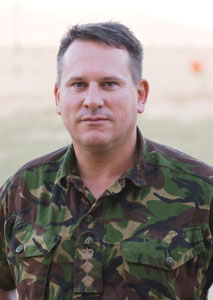 Col. Richard Kemp, a retired British Army Officer and counter-terrorism specialist, has seen his share of combat. On Sunday, Dec. 4, he will share his unique perspective on the Israel Defense Forces’ ethical conduct on the battlefield as the keynote speaker at the fourth annual Kansas City Israel Action Forum. The forum, sponsored by the American Israel Public Affairs Committee, will be held from 1:30 to 5 p.m. at The Temple, Congregation B’nai Jehudah. The theme of the event is “Israel’s Legacy of Morality.”
Col. Richard Kemp, a retired British Army Officer and counter-terrorism specialist, has seen his share of combat. On Sunday, Dec. 4, he will share his unique perspective on the Israel Defense Forces’ ethical conduct on the battlefield as the keynote speaker at the fourth annual Kansas City Israel Action Forum. The forum, sponsored by the American Israel Public Affairs Committee, will be held from 1:30 to 5 p.m. at The Temple, Congregation B’nai Jehudah. The theme of the event is “Israel’s Legacy of Morality.”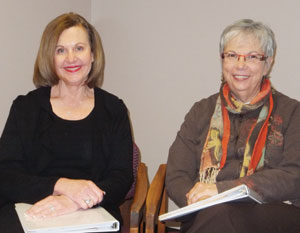 More and more, women are taking an active role in deciding how their philanthropic dollars are spent. One way local Jewish women can do that is by joining the Circle of Chai.
More and more, women are taking an active role in deciding how their philanthropic dollars are spent. One way local Jewish women can do that is by joining the Circle of Chai.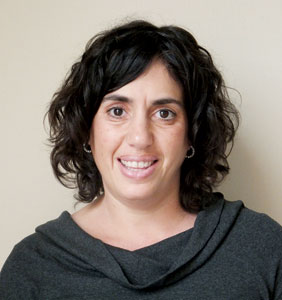 Amy Shapiro’s answer to the question why she is so committed to the Jewish Federation of Greater Kansas City reveals a lot about what makes the Federation uniquely important, as well as what makes it hard to communicate its often behind-the-scenes role in making our Jewish community a great place to work and live.
Amy Shapiro’s answer to the question why she is so committed to the Jewish Federation of Greater Kansas City reveals a lot about what makes the Federation uniquely important, as well as what makes it hard to communicate its often behind-the-scenes role in making our Jewish community a great place to work and live.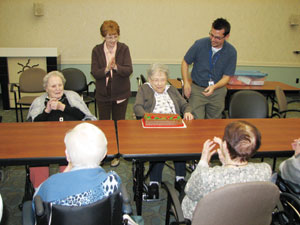
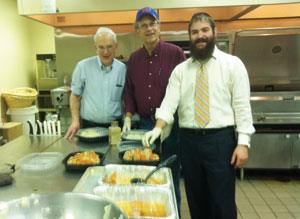 HAPPY THANKSGIVING — As Thanksgiving approached last week, a few of Kehilath Israel’s Kosher Country volunteers gathered to assemble Thanksgiving dinners for eight families. A total of 32 people, all clients of Yachad: The Kosher Food Pantry, were fed. K.I. volunteers included Maury and Phyllis Kohn, Alfie Kass and Dan Kass. Rabbi Mendel Segal of the Vaad HaKashruth of Greater Kansas City served as the kosher supervisor and pitched in to help the cooking effort. A Yachad client also helped provide this mitzvah. Dan Kass, also known as the chief Kosher Country chef, organized this project because he wanted to start a chesed project at Kehilath Israel Synagogue that would reach out to others in the Jewish community. He contacted Sherrill Parkhurst, Yachad’s volunteer director, because Kosher Country already collects food for the food pantry at K.I. events. Anyone interested in cooking holiday meals for Yachad’s clients in the future should contact Dan Kass at
HAPPY THANKSGIVING — As Thanksgiving approached last week, a few of Kehilath Israel’s Kosher Country volunteers gathered to assemble Thanksgiving dinners for eight families. A total of 32 people, all clients of Yachad: The Kosher Food Pantry, were fed. K.I. volunteers included Maury and Phyllis Kohn, Alfie Kass and Dan Kass. Rabbi Mendel Segal of the Vaad HaKashruth of Greater Kansas City served as the kosher supervisor and pitched in to help the cooking effort. A Yachad client also helped provide this mitzvah. Dan Kass, also known as the chief Kosher Country chef, organized this project because he wanted to start a chesed project at Kehilath Israel Synagogue that would reach out to others in the Jewish community. He contacted Sherrill Parkhurst, Yachad’s volunteer director, because Kosher Country already collects food for the food pantry at K.I. events. Anyone interested in cooking holiday meals for Yachad’s clients in the future should contact Dan Kass at 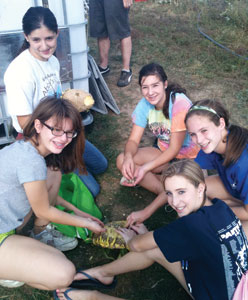 Cyndi Lauper sings a song about girls just wanting to have fun. That may be true for many, but not the girls who enroll in Doog-Maot, a program sponsored by CAJE’s Learning for Life initiative that just finished its inaugural session. These girls have fun, while at the same time confirming their Judaism and helping others.
Cyndi Lauper sings a song about girls just wanting to have fun. That may be true for many, but not the girls who enroll in Doog-Maot, a program sponsored by CAJE’s Learning for Life initiative that just finished its inaugural session. These girls have fun, while at the same time confirming their Judaism and helping others.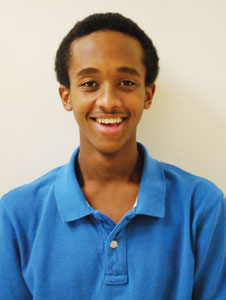 Jacob Mehari is not the typical California-born American teen. This month’s Salute to Youth honoree may have been born in Sacramento, Calif., but his roots go all the way to Ethiopia. Although he spent his early years in the USA, he lived in Israel from the ages of 6 to 10.
Jacob Mehari is not the typical California-born American teen. This month’s Salute to Youth honoree may have been born in Sacramento, Calif., but his roots go all the way to Ethiopia. Although he spent his early years in the USA, he lived in Israel from the ages of 6 to 10.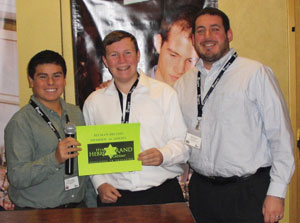 JUMP SEMINAR — Last week we published a press release about a Hyman Brand Hebrew Academy student who participated in the National JUMP Leadership Seminar in late October. It neglected to mention that two HBHA students — Daniel Zepeda and Cameron Burns — actually attended the seminar, along with Hillel Goldstein, NCYS’s local adviser. The seminar marked the beginning of the third annual JUMP Challenge in which HBHA will compete to create and implement four communitywide projects including a chesed event, a Torah education event, a fundraiser event and an Israel advocacy initiative. The school will have until the spring to complete these challenges, after which the school will be judged on its creativity, teamwork and the success and quality of the programs. The JUMP director, Carol Rhine, added a handwritten note to her letter to Howard Haas, HBHA’s head of school, saying, “We were so impressed with your students. You should be extremely proud of them!”
JUMP SEMINAR — Last week we published a press release about a Hyman Brand Hebrew Academy student who participated in the National JUMP Leadership Seminar in late October. It neglected to mention that two HBHA students — Daniel Zepeda and Cameron Burns — actually attended the seminar, along with Hillel Goldstein, NCYS’s local adviser. The seminar marked the beginning of the third annual JUMP Challenge in which HBHA will compete to create and implement four communitywide projects including a chesed event, a Torah education event, a fundraiser event and an Israel advocacy initiative. The school will have until the spring to complete these challenges, after which the school will be judged on its creativity, teamwork and the success and quality of the programs. The JUMP director, Carol Rhine, added a handwritten note to her letter to Howard Haas, HBHA’s head of school, saying, “We were so impressed with your students. You should be extremely proud of them!” 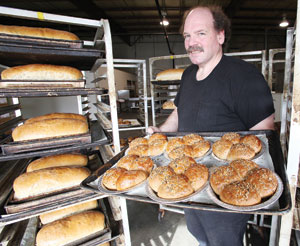 To paraphrase Mark Twain, the reports of Bagel Works’ demise are greatly exaggerated. In fact, they are completely false.
To paraphrase Mark Twain, the reports of Bagel Works’ demise are greatly exaggerated. In fact, they are completely false.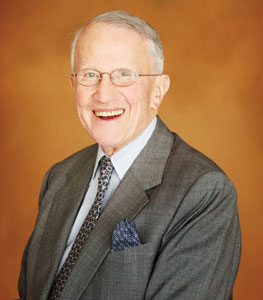 The Sosland name is well-known throughout philanthropic circles in the area. So you would think that over the years Morton Sosland would have stood at a variety of podiums accepting awards on behalf of his or his family’s generosity. But, until now, he has graciously refused those requests.
The Sosland name is well-known throughout philanthropic circles in the area. So you would think that over the years Morton Sosland would have stood at a variety of podiums accepting awards on behalf of his or his family’s generosity. But, until now, he has graciously refused those requests.